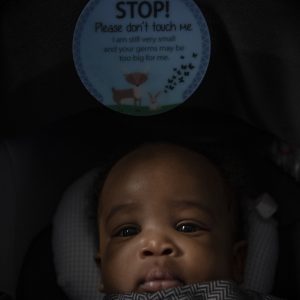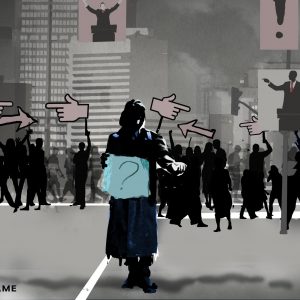eSwatini needs to talk about illegal abortions
Because pregnancies can only be terminated legally in extreme instances such as rape, many women find other ways. And many do not survive the process.
Author:
27 October 2020

On 22 May 2000, Elizabeth Matimba and Joyce Mdluli sat on benches in the High Court of Swaziland (eSwatini) in Mbabane and heard Judge Thomas Masuku denounce them for the crime of abortion. Matimba had, in 1998, taken her pregnant daughter to Mdluli, then a nurse at Mbabane Government Hospital, and asked that she terminate the pregnancy. Mdluli obliged. For this crime, the women were both sentenced to five years in jail.
The case later went to the appeal court, where Judge Jules Browde spoke out strongly against abortion. He nevertheless reduced Matimba’s sentence to three years. The nurse’s conviction and sentence were set aside on the grounds that the crown had failed to prove her guilt beyond reasonable doubt.
In eSwatini, women cannot of their own free will terminate a pregnancy. It is a crime. That, of course, changes nothing. They go ahead and procure abortions anyway.
Related article:
At the Raleigh Fitkin Memorial Hospital in Manzini, says medical doctor Mbuso Sihlongonyane, four women a day, on average, are treated for incomplete or botched abortions. “The fact is we see quite a number. Like, per day, we see quite a number… Almost daily there’s quite a list of people who have to be treated for incomplete abortions. It varies, obviously, on the time of the month and the time of the week. But on average I would say it is four cases per day. That’s in a cycle of 24 hours. Some days in some periods of the year the figure can get up to 10.”
Manzini is the country’s biggest town and its centre of business. Up the road to the west is Matsapha, the industrial heartland where more than 15 000 people work in textile firms. Many of them are women. They come from Siteki in Lubombo, Mayiwane in Hhohho, Sidzakeni and other underdeveloped rural regions of eSwatini. Their meagre wages get them one-room lodgings in places along the MR3 Highway in Matsapha and Manzini. But the one centre that attends to their daily health needs is the 350-bed hospital founded in 1926 by the Church of the Nazarene.
“They are in their 20s and early 30s, working already. We are in Manzini. So most of these women come from Matsapha, the country’s industrial hub. They work at the firms,” said Sihlongonyane.
Avoiding questions
Abortion is the medical term doctors use for all pregnancies not carried to term, whether they are induced or spontaneous. What the public know as a miscarriage is, in a clinical setting, an abortion too, only spontaneous. And because elective termination of a pregnancy is illegal in eSwatini, medical personnel choose not to ask too many questions.
“There’s no way you can know for sure,” said Sihlongonyane. “And if you ask her she’ll deny it anyway, unless maybe by chance you find pills on her person. But we never really pursue this line. That’s not our job. We just do what we can to save her. If she needs blood, we help with a transfusion, etc.”
Sihlongonyane says most women come to the hospital when they are in a lot of pain. The two symptoms common to most cases are vaginal bleeding and stomach cramps. “So they come at different stages. Some come just when complications begin, some come when they have lost a lot of blood and need a transfusion, and some come when they’ve developed some infection or other and need to be admitted.”
Related article:
He would not comment on the mortalities that are a result of some incomplete abortions. The Health Management and Information System of eSwatini had also not responded to requests for data in this regard at the time of publishing. While he is not at liberty to share specific numbers, Sihlongonyane says he knows that many women die each year owing to complications stemming from incomplete abortions, in major hospitals and elsewhere.
The World Health Organization (WHO) does, however, cite unsafe abortions as a major cause of death among pregnant women in the country. eSwatini’s maternal mortality ratio stood at 437 as of 2017. This is the number of deaths per 100 000 live births.
The WHO found that “significantly, pregnant women continue to die from five major preventable causes: severe postpartum haemorrhage, obstetric infections, hypertensive disorders, unsafe abortion and obstructed labour”. But the number might be much higher because “in reporting on maternal deaths, eSwatini does not disaggregate by cause”.
Blaming the healers
On 6 March 2006, Thuli Siyaya died while undergoing a pregnancy termination procedure administered by Badelisile Mkhulisi at her home. Mkhulisi, then 64 years old, was a traditional healer. At the high court in Mbabane, Mkhulisi testified that she had an assistant administer a sponge to the anus of the deceased. She then prepared medicines known as umhlabelo and imbita and administered it to Siyaya as a drink and through the anus using an “enema spade”. Mkhulisi then continued to put her spade in Siyaya’s vagina, but she lost “strength and died”.
The procedure Mkhulisi described in court likely continues to take place in the healing huts of many traditional healers in every corner of the country. Mkhulisi had successfully helped terminate pregnancies prior to attending to Siyaya. She had been convicted for one and sentenced to a three-year jail term.
Related article:
Although abortion is illegal in the country, there is no specific legislative framework that deals with supposed offenders. Judges often depend on the common law to deal with such cases. Convicting offenders is easy, provided the state is thorough in presenting its evidence. It is sentencing that is often a problem. At the high court level, offenders usually get about five years in jail. The Supreme Court of eSwatini reduces these terms to about three years. That has been the pattern so far, at least.
In Mkhulisi’s case, the crime of abortion was not necessarily the focus. A person had died, so hers was the crime of culpable homicide. The high court sentenced her to nine years in jail. The supreme court reduced that to only three because of her fragile health and age. Moreover, the deceased’s family did not show any hostility to Mkhulisi. On the day Siyaya died, they had talked it over and moved on. They seemed to accept it as merely an accident and understood that their relative had wanted to terminate her pregnancy. Nowhere did they express opposition to that.
When is it ever allowed?
While affirming that abortion remains illegal, Section 15(5) of the eSwatini Constitution, promulgated in 2005, does provide for instances where it may be allowed. These are if the pregnancy constitutes a serious threat to the health of the mother, if there is a serious risk that the child will be seriously handicapped if born and when the pregnancy is the result of incest or rape.
Sihlongonyane says doctors seldom deal with any such cases at Raleigh Fitkin Memorial Hospital. When they do get cases where the pregnancy will likely result in a deformed baby being born, the parents usually refuse to abort, citing religious reasons. On terminating pregnancies that are the result of rape, Sihlongonyane says there has been no such case in all the years that he has been an obstetrician at the hospital.
Lindiwe Mhlanga, the programmes manager at Swaziland Action Group Against Abuse, an organisation that helps abused children gain access to justice, says in recent times no pregnant minors have been helped to get an abortion. The group, she says, is aware of the procedure that ought to be followed. The rape must have been reported to the police, preferably within five months of it happening, and then a court should issue an order allowing a hospital to carry out the pregnancy termination. Despite knowing this, the group has not helped anyone go through such a process, and won’t say why.
Related article:
Lusito Tsela, the communications officer at Save the Children eSwatini, an organisation that champions the rights of children and also helps those who are abused, says the staff deal with many pregnant minors all the time. And their pregnancies are, by definition, the result of rape. The organisation has not helped any minor procure an abortion, however.
Tsela cited a 2018 case in which the police, instead of helping a minor terminate a pregnancy that was the result of rape, insisted that she carry the baby to term so the perpetrator could be “caught”.
Religious attitudes
eSwatini is a deeply religious country. Christianity has just as strong a hold as tradition. Because of this, even mere talk about the subject of abortion is taboo. That is part of the reason why there have been no comprehensive debates in Parliament on this issue, and no laws drafted.
Not even non-governmental organisation Women and Law-eSwatini is actively involved in campaigns for the legalisation of abortion in the country. It has dealt with a range of issues, from women’s access to land to their involvement in the small-business space, but never abortions, says legal officer Dumsani Dlamini.
Humanitarian information portal ReliefWeb reported in 2012 that The Family Life Association of Swaziland (Flas) was “calling for the legalisation of abortion on the grounds of women’s health”. The article says “more than 1 000 women were treated for abortion-related complications at a single clinic in … Manzini” in October 2012.
Related article:
But Phila Nhlabatsi from Flas said, “The information used in the article is incorrect and Flas will not associate itself with it. Abortion remains illegal in the country of eSwatini, so Flas operates in the legal framework of the country. We do not treat women or anyone for abortion-related [complications] or abortions. However, in a case where we might suspect any foul play, we refer the client to RFM [Raleigh Fitkin Memorial] hospital. Flas will continue to operate in the legal framework of country whether they change or not.”
Flas is the foremost organisation for women’s reproductive rights in the country, so it sticking so rigidly to the government line is reason for concern.
Those with passports and money go to South Africa, where they get treatment in public and private institutions. The rest are stuck in eSwatini, with illegal abortionists and traditional healers whose methods often lead to casualties.
The beginning of a robust debate?
On 29 September, the eSwatini Observer newspaper led with a story titled “Legalise abortion, [calls] Judge Qinisile”. While presiding over a case in which a mother had killed her four-year-old child, Judge Qinisile Mabuza suggested that it might be better for a pregnant woman to get rid of a foetus than to kill a growing child.
The newspaper reported Mabuza as having said that she views the current laws as “shackling women’s autonomy”. She then vowed to “tackle the current ban on abortion before she retires from the bench”.
If anything, this has opened up the conversation. In the same report, Deputy Prime Minister Themba Masuku welcomed the judge’s words and said such a debate is necessary. He, however, immediately took a stance: “But we cannot allow a situation where it is a free-for-all, where people can be allowed to make babies and then wake up in the morning to say they do not want them.”
His is the voice of power, the voice of one in charge. And that voice has been dominant since the country gained its independence from Britain in 1968.





